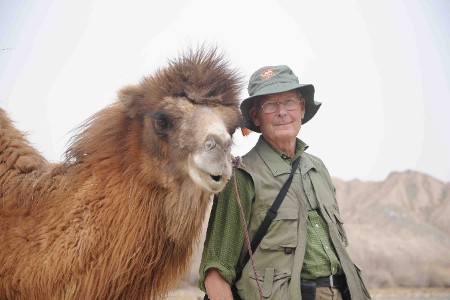
John Hare
|
|
John Hare
|
John Hare worked in Kenya for the United Nations Environment Programme (UNEP). During this time he undertook a number of expeditions into remote parts of northern Kenya, frequently on horseback and also with camels and often alone. This re-kindled a life-long passion for camels.
In 1993, he took advantage of a chance offer from a Russian scientific team to research the status of the wild Bactrian camel in Mongolia – the 8th most endangered large mammal in the world. The wild camel is a critically endangered species numbering no more than 1000, and only survives in four habitats in the Gobi desert in China and Mongolia.
In 1997, John Hare founded the Wild Camel Protection Foundation (WCPF), a UK registered charity of which Dr. Jane Goodall DBE is the Life Patron. In 2002, the Chinese government agreed to the establishment of the Lop Nur Wild Camel National Nature Reserve in Xinjiang Province in the former nuclear test site. Measuring 155,000 square kilometres and almost the size of Bulgaria or Texas, the WCPF became responsible for helping the Chinese to establish one of the largest nature reserves in the world, protecting not only the wild Bactrian camel but many other IUCN Red Book listed endangered fauna and flora. John Hare is the sole international consultant for the Reserve.
In 2004 the WCPF established the Hunter Hall Captive Wild Bactrian Camel Breeding Centre at Zakhyn Us in Mongolia with twelve wild Bactrian camels, which had been captured by Mongolian herdsmen. This is the only place where the wild Bactrian camel is held in captivity apart from two zoos in China and in 2010 the population had increased to twenty-five. With advice from the Zoological Society of London (ZSL), there is a plan to undertake the first release of the captive wild Bactrian camels back into the Gobi desert.
John has kindly agreed to answer Basha’s questions.
|
Who do you think was the most influential explorer in history and why? Ibn Battuta, because his journeys in the fourteenth century spanned nearly thirty years and covered almost the entire known Islamic world, extending from North Africa, West Africa, Southern and Eastern Europe to the Middle East, India, Central Asia and China He travelled more than 75,000 miles, a figure unlikely to have been surpassed by any traveller until some 450 years later with the arrival of the steam age. |
|
|
Colonel Percy Fawcett, because as a young boy I was totally gripped by the story of his travels into the Brazilian jungle in a search for the Matto Grosso and Inca gold.
What is your favourite exploration book and why? Exploration Fawcett (see above)
|
|
|
What is your favourite exploration film and why? I do not have one.
|
|
|
If you were travelling to the South Pole in the “Heroic Age,” would you prefer to travel with Shackleton, Amundsen or Scott, and why? Shackleton for his superior leadership qualities. I feel I could relate to Shackleton more so than to Scott or Amundsen |
What was the most dangerous situation you survived?
There are two:
(1) When our truck broke down on the brittle rock salt of Lop Nur in China. Our tyres were being shredded and we had to put cooking oil into the engine as we were burning oil faster than we were using petrol. I estimate we were at the time 250 miles from the nearest person in any direction.
Also (2), when 20 of our 22 camels ran off in a sand storm leaving us marooned on the dried-up lake of Lop Nur, shortly after the Chinese had exploded an underground nuclear device. We were separated from our vehicles by 280 miles of one of the most hostile sections of the Gobi desert during the season of extremely turbulent sand storms.
|
What is the single greatest change you have witnessed in the exploration world since you began? The power of satellites and their ability to provide communication no matter where you are in the world
What modern technology or techniques do you find most helpful? The Global Positioning System
|
What piece of equipment always goes with you?
A compass
Which book would you recommend to would-be explorers today?
Kim by Rudyard Kipling. I always carry it into the desert, not because it helps with exploration but because it is a very good read and provides great solace when times are tough.
What would you tell young explorers to be wary of?
Over confidence
Why is it important for humans to continue exploring?
If ‘exploration’ in the broadest sense ceases, then the human race will stagnate and eventually die out.
Which of your achievements do you think will be most remembered?
I hope it is the establishment of the Lop Nur Wild Camel National Nature Reserve which protects the wild camel in China’s former nuclear test site.
Wild Camel Protection Foundation
Main Stories from the Road page